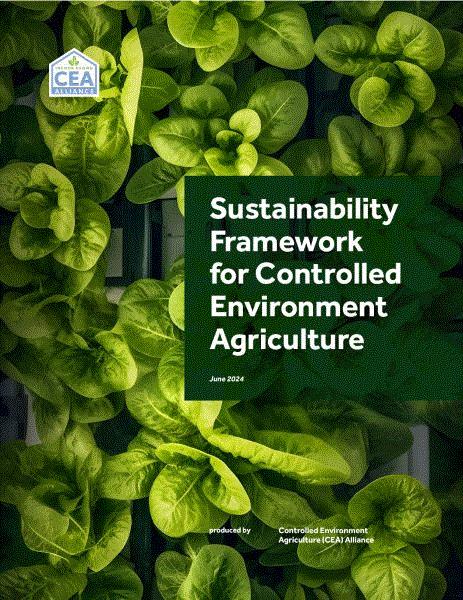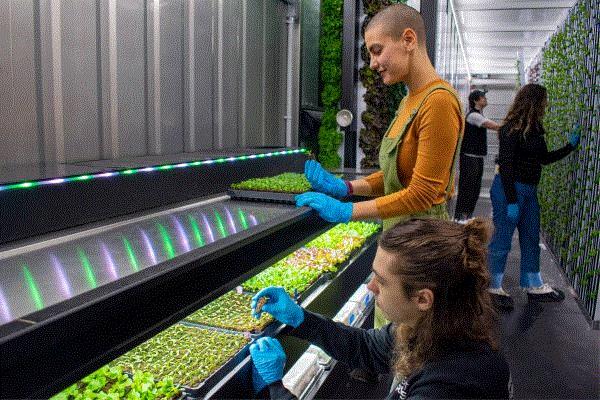CEA Alliance Releases CEA Sustainability Framework

At the recent
Indoor AgTech Innovation Summit in Chicago on June 24-25, the CEA Alliance announced the release of their “Sustainability Framework for Controlled Environment Agriculture,” a set of sustainability frameworks designed by indoor growers to help drive transparency and credibility in the field. Designed by CEA producers to assess and communicate key impacts through a data-driven approach, the framework is meant to be simple, flexible, inclusive and outcome-based. Through a year of development, the framework contains 60 metrics within 20 different Key Performance Indicators (KPIs), including:
-
Natural resource and climate impacts
-
Pesticide use
-
Waste generation
-
Food safety
-
Employment practices
-
Community engagement
-
Food security impacts
“The CEA Alliance believes an industry-led commitment to standardized measurement is important to achieving and understanding true value; that’s why we’ve proactively come together to develop these metrics,” said CEA Alliance Executive Director Tom Stenzel in the announcement. “We hope this framework will support indoor growers at every stage of their sustainability journey, as well as encourage outdoor growers, packers and processors to include the entire supply chain from field to finished product in their measurement of impacts.”
For more information about the sustainability framework, the
press release and the
full report can be accessed on the CEA Alliance website.

APHIS Deregulates Tomato Brown Rugose Fruit Virus in Fruit for Consumption
The USDA Animal and Plant Health Inspection Service (APHIS) recently announced a Federal Order updating the regulations around safely deregulating the allowance of tomato brown rugose fruit virus (ToBRFV)-positive tomatoes and peppers for consumption, an important step in protecting the domestic tomato and pepper industries.

The decision was based on a August 2023 analysis that concluded that “ToBRFV is unlikely to reach commercial production areas in the United States through fruit brought to market for consumption. Rather, the virus is likely to reach U.S. production areas via the propagative plant materials pathway,” and under the new regulations, APHIS will continue to safeguard propagative materials but will now allow producers to market fruit from facilities with positive rugose fruit virus detections rather than resorting to crop destruction.
More information about the Federal Order and its regulations can be found on the APHIS website or on the associated FAQ.

Freight Farms Partners Up to Put Farms in Innovative Places
As many of you might know, I like to impart parts of myself on my role as editor-at-large for Inside Grower, and a heavy component of that is my passion and encouragement for projects helping to reduce the barriers between CEA and the public. As multiple projects have been announced this month, I wanted to stop and focus on two involving the Boston-based company Freight Farms.

-
Back in January, 2024, the Museum of Science, Boston opened their newest exhibit in the form of a small, vertical smart farm through a partnership with Freight Farms and Green City Growers. Named ‘The Garden,’ the unit will have a window so museum-goers can watch as Green City Growers visits twice weekly to tend the farm. “Climate change is hands-down the most pressing scientific problem of our time,” said David Sittenfeld, Director for the MUSB Center for the Environment. “The scale of it can certainly feel overwhelming. But there is good reason for hope in the innovation and ingenuity of so many determined minds grappling with the consequences of a changing planet, and the scientific and technological tools at our disposal to mitigate the effects of climate change while creating a better world.” More information can be found on the MOS press release or the Green City Grower press release.
-
Major League Baseball (MLB) recently announced they would be fulfilling a wish made by the local A.G. Gaston Boys and Girls Club in Birmingham, Alabama, as they unveiled a new hydroponic farm furnished by Freight Farms. The farm will be used to help educate youth in the community about the importance of food production and nutrition, and the produce will be donated to local neighbors. For more, check out the article at WBRC News.

Little Leaf Farms to Open Largest CEA Leafy Greens Campus in North America

Pardon my horrible pun, but there’s much to do in McAdoo, Pennsylvania, this week as Little Leaf Farms announced the expansion of their leafy greens production with a new 10-acre greenhouse. Their third greenhouse in the state, Little Leaf Farms is already the No. 1 producer of CEA-grown packaged lettuce in the US and this new construction will make their PA presence the largest leafy greens CEA campus in North America. The move will also add jobs as they increase their headcount to over 300 and keep an eye out in the Southeast and Midwest regions as they expand to over 7,000 grocery stores.
Windy City Harvest Initiative Helps Grow Next Generation of Chicago Farmers
As I stand on my soap box this week and include a piece that is meaningful to me, I wanted to include an article by the Chicago Sun Times highlighting the Windy City Harvest initiative, aka the Chicago Botanic Garden’s urban agriculture and jobs training program. Headquartered at a farm in the North Lawndale neighborhood of Chicago, Windy City harvest hosts roughly 50 students annually as they learn about the labor-intensive practice of farming.
Of the 264 successful graduates since the programs inception in 2009, the program has a 6-month job placement rate of 91% and has been the catalyst for the founding of a dozen different independently owned businesses in the community, 80% of which are majority owned by people of color or indigenous operators. The program has also distributed more that 44,000 boxes of produce into the community since 2016 as they partner with the local Lawndale Christian Health Center. I could speak for pages about the benefits of programs like these as they help bring people closer to their food, but I highly encourage you to check out more about the Windy City Harvest program and other similar initiatives in your surrounding community!





Stay curious, ask questions and let me know how it goes at scampbell@ballpublishing.com.

Dr. Sean Campbell
Editor-at-Large
Inside Grower
This email received by 32,662 loyal readers!
Interested in advertising in Inside Grower? Contact Paul Black or Kim Brown and they'll show you how easy, effective and affordable it is.